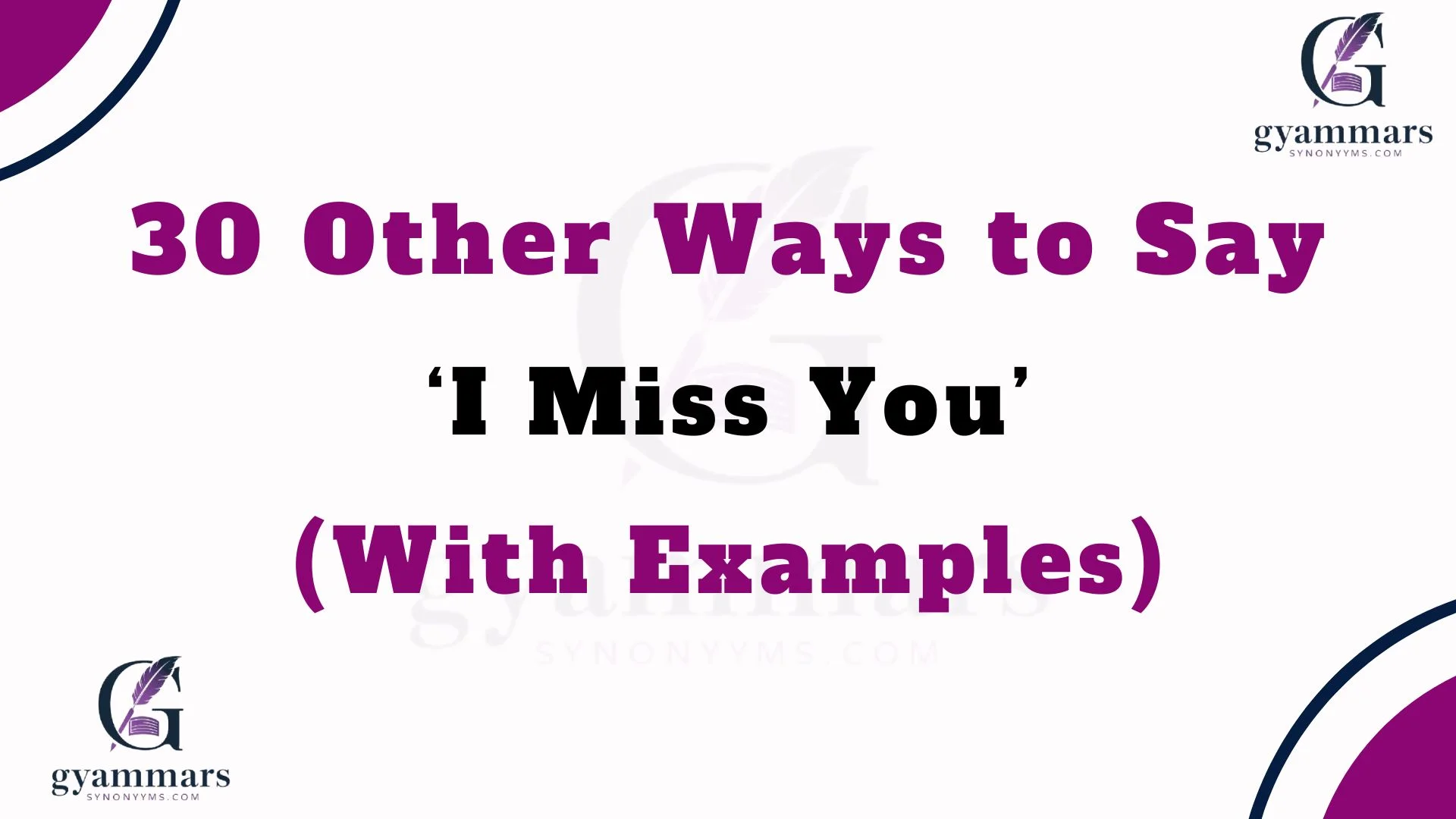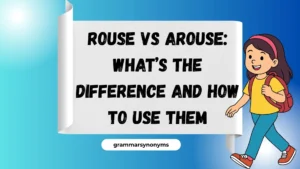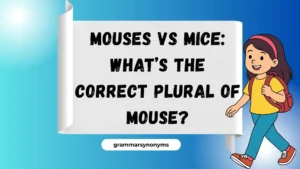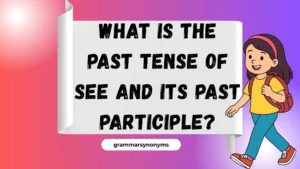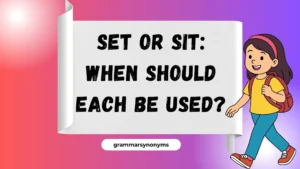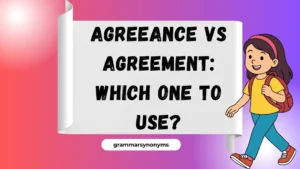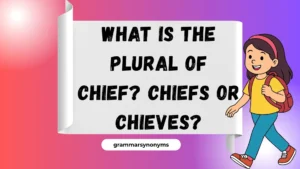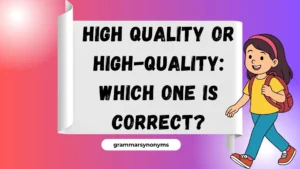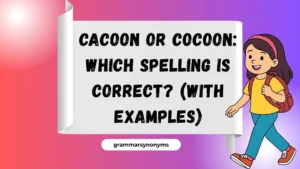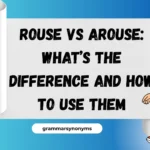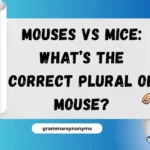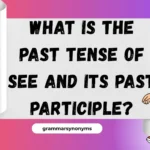Finding the right words to express care and longing can mean the world to someone you cherish. Saying “I miss you” is powerful, but sometimes you may want to express it in different ways that feel more personal, unique, or emotionally deep.
Whether you’re speaking to a partner, a friend, or a loved one far away, choosing the right phrase can strengthen connection and make your message more heartfelt and memorable.
What Does “I Miss You” Mean?
At its core, “I miss you” is a phrase used to express the emotional longing and absence you feel when someone important isn’t around. It communicates love, care, and connection while acknowledging that their presence brings joy, comfort, or security.
Is It Professional/Polite to Say “I Miss You”?
Saying “I miss you” is polite in personal relationships—family, close friends, or romantic partners. However, in professional settings, it may feel too personal or emotional. Instead, opt for softer alternatives like “I look forward to seeing you again” or “It’s been a while since we last connected” to maintain professionalism.
Pros or Cons of Saying “I Miss You”
Pros:
- Shows genuine affection and care
- Strengthens emotional bonds
- Simple and universally understood
Cons:
- May feel too emotional in casual or professional settings
- Can sound repetitive if overused
- May be misunderstood in newer relationships
Synonyms For “I Miss You”
- I’ve Been Thinking About You
- I Wish You Were Here
- Life Isn’t the Same Without You
- Can’t Wait to See You Again
- You’ve Been on My Mind
- I Feel Lonely Without You
- Counting the Days Until I See You
- I Feel Your Absence Deeply
- Wish We Could Be Together
- You’re Always in My Heart
- I Long for Your Company
- Things Aren’t the Same Without You
- I Yearn for You
- I Crave Your Presence
- I Miss Your Smile
- My Days Feel Empty Without You
- I Look Forward to Seeing You Soon
- I Keep Thinking of You
- I Miss Our Talks
- The Distance Feels Hard
- I Miss Your Energy
- I’m Eager to Reconnect
- I Miss the Way You Make Me Laugh
- Home Doesn’t Feel the Same Without You
- I’m Lost Without You Around
- I Miss Our Moments Together
- I Feel Incomplete Without You
- It’s Hard Not Having You Here
- I Miss Your Presence Every Day
- Being Apart Makes Me Realize How Much You Mean
1. I’ve Been Thinking About You
Definition: A gentle way to show someone they’re on your mind.
Detailed Explanation: This phrase shifts the focus from absence to attention, showing emotional presence even in distance.
Scenario Example: “I’ve been thinking about you a lot lately—I hope everything’s going well.”
Best Use: Great for friends, family, or romantic partners.
Tone: Warm, thoughtful, caring.
Additional Notes: Works both personally and semi-professionally.
2. I Wish You Were Here
Definition: A direct expression of longing for someone’s presence.
Detailed Explanation: Highlights the value of their company and the emptiness felt in their absence.
Scenario Example: “This sunset is beautiful, but I wish you were here to see it with me.”
Best Use: Romantic or sentimental situations.
Tone: Emotional, heartfelt.
Additional Notes: Stronger than “I miss you,” but equally tender.
3. Life Isn’t the Same Without You
Definition: Communicates how much someone’s absence impacts daily life.
Detailed Explanation: It emphasizes the depth of emotional attachment.
Scenario Example: “Life isn’t the same without you around—it feels too quiet.”
Best Use: Deep connections (family, partners).
Tone: Emotional, sincere.
Additional Notes: Best for people very close to you.
4. Can’t Wait to See You Again
Definition: Expresses excitement and anticipation for a reunion.
Detailed Explanation: More forward-looking than focusing on current absence.
Scenario Example: “Can’t wait to see you again this weekend!”
Best Use: Friends, partners, even colleagues.
Tone: Cheerful, excited.
Additional Notes: A hopeful twist on missing someone.
5. You’ve Been on My Mind
Definition: Subtle acknowledgment of care and longing.
Detailed Explanation: Shows affection without being too heavy.
Scenario Example: “You’ve been on my mind these past few days—how are you doing?”
Best Use: Casual, semi-formal, or personal.
Tone: Gentle, thoughtful.
Additional Notes: Works across different relationships.
6. I Feel Lonely Without You
Definition: Expresses emotional emptiness when someone is absent.
Detailed Explanation: Direct yet tender; shows emotional vulnerability.
Scenario Example: “I feel lonely without you by my side.”
Best Use: Romantic partners.
Tone: Emotional, intimate.
Additional Notes: Use with people you trust deeply.
7. Counting the Days Until I See You
Definition: Expresses eagerness and longing.
Detailed Explanation: Conveys a hopeful countdown toward reunion.
Scenario Example: “I’m counting the days until I see you again.”
Best Use: Long-distance relationships.
Tone: Loving, optimistic.
Additional Notes: Adds a positive, hopeful spin.
8. I Feel Your Absence Deeply
Definition: Strong acknowledgment of emotional impact.
Detailed Explanation: Emphasizes the weight of missing someone.
Scenario Example: “I feel your absence deeply—it’s not the same without you.”
Best Use: Deep connections, long-distance partners.
Tone: Emotional, tender.
Additional Notes: Serious in tone, not casual.
9. Wish We Could Be Together
Definition: Expresses desire for closeness.
Detailed Explanation: Highlights distance and longing.
Scenario Example: “I wish we could be together tonight.”
Best Use: Romantic partners.
Tone: Sentimental, longing.
Additional Notes: Good for heartfelt texts.
10. You’re Always in My Heart
Definition: A spiritual, deeply affectionate phrase.
Detailed Explanation: Suggests that distance doesn’t affect love.
Scenario Example: “Even if we’re apart, you’re always in my heart.”
Best Use: Romantic or family.
Tone: Loving, emotional.
Additional Notes: Works beautifully in heartfelt letters.
11. I Long for Your Company
Definition: Expresses a strong desire to be around someone.
Detailed Explanation: This phrase conveys deep affection and emotional need for someone’s presence.
Scenario Example: “I long for your company—everything feels dull without you.”
Best Use: Romantic or very close friendships.
Tone: Emotional, heartfelt.
Additional Notes: Works beautifully in heartfelt messages or love letters.
12. Things Aren’t the Same Without You
Definition: A soft but meaningful way to show absence changes everything.
Detailed Explanation: Highlights how life feels different without their presence.
Scenario Example: “Things aren’t the same without you at work—it feels too quiet.”
Best Use: Can be casual (work, family) or personal.
Tone: Warm, thoughtful.
Additional Notes: Very versatile and not overly sentimental.
13. I Yearn for You
Definition: A passionate and poetic way of expressing longing.
Detailed Explanation: Carries romantic weight and suggests deep emotional desire.
Scenario Example: “I yearn for you every night when we’re apart.”
Best Use: Romantic relationships.
Tone: Passionate, emotional.
Additional Notes: Best for love letters or romantic texts.
14. I Crave Your Presence
Definition: A bold expression of emotional or physical longing.
Detailed Explanation: Conveys intensity of missing someone in a raw, honest way.
Scenario Example: “I crave your presence more than anything right now.”
Best Use: Romantic and intimate relationships.
Tone: Intense, intimate.
Additional Notes: Best avoided in professional or casual settings.
15. I Miss Your Smile
Definition: Highlights a specific trait or detail you long for.
Detailed Explanation: More personal than just “I miss you,” as it focuses on what you love most.
Scenario Example: “I miss your smile—it always brightens my day.”
Best Use: Friends, partners, family.
Tone: Sweet, affectionate.
Additional Notes: Adds a touch of warmth and specificity.
16. My Days Feel Empty Without You
Definition: Emphasizes how much someone fills your daily life.
Detailed Explanation: Expresses emotional emptiness when someone is gone.
Scenario Example: “My days feel empty without you around.”
Best Use: Deep romantic bonds or family.
Tone: Emotional, reflective.
Additional Notes: Very intimate, use with people who understand your depth.
17. I Look Forward to Seeing You Soon
Definition: Focuses on anticipation rather than absence.
Detailed Explanation: A positive and hopeful alternative to “I miss you.”
Scenario Example: “I look forward to seeing you soon—let’s plan something!”
Best Use: Romantic, family, or even professional.
Tone: Optimistic, lighthearted.
Additional Notes: Professional-friendly.
18. I Keep Thinking of You
Definition: A continuous reminder of affection.
Detailed Explanation: Suggests ongoing emotional attachment and thoughtfulness.
Scenario Example: “I keep thinking of you and all the fun times we’ve had.”
Best Use: Versatile—romantic, family, friends.
Tone: Warm, reflective.
Additional Notes: Works well in casual conversations too.
19. I Miss Our Talks
Definition: Focuses on specific shared experiences.
Detailed Explanation: Shows nostalgia for shared conversations and bonding.
Scenario Example: “I miss our talks—they always made me feel lighter.”
Best Use: Close friends or family.
Tone: Sentimental, warm.
Additional Notes: Highlights emotional connection through communication.
20. The Distance Feels Hard
Definition: Acknowledges the difficulty of physical separation.
Detailed Explanation: Simple yet heartfelt way to express struggles of being apart.
Scenario Example: “The distance feels hard, but I know we’ll get through it.”
Best Use: Long-distance partners or family.
Tone: Honest, tender.
Additional Notes: Perfect for expressing both love and resilience.
21. I Miss Your Energy
Definition: Compliments someone’s personality and presence.
Detailed Explanation: Shows you value their vibe, positivity, or enthusiasm.
Scenario Example: “I miss your energy—the room feels dull without you.”
Best Use: Friends, family, or partners.
Tone: Upbeat, caring.
Additional Notes: Adds a personal, appreciative touch.
22. I’m Eager to Reconnect
Definition: Expresses anticipation to rebuild closeness.
Detailed Explanation: Softer than “I miss you,” more forward-looking.
Scenario Example: “I’m eager to reconnect over coffee soon.”
Best Use: Friends, colleagues, acquaintances.
Tone: Polite, professional-friendly.
Additional Notes: Excellent for networking or casual reunions.
23. I Miss the Way You Make Me Laugh
Definition: Focuses on joy the person brings.
Detailed Explanation: Personal and heartfelt—links absence to emotional happiness.
Scenario Example: “I miss the way you make me laugh—you always cheer me up.”
Best Use: Friends, romantic partners.
Tone: Warm, affectionate.
Additional Notes: Perfect for lighthearted yet emotional messages.
Also Read This: 30 Other Ways to Say ‘Make a Difference’ (With Examples)
24. Home Doesn’t Feel the Same Without You
Definition: Ties absence to comfort and belonging.
Detailed Explanation: Suggests the person defines “home” for you.
Scenario Example: “Home doesn’t feel the same without you here.”
Best Use: Family or partners.
Tone: Emotional, nostalgic.
Additional Notes: Very touching in long-distance family messages.
25. I’m Lost Without You Around
Definition: Shows strong dependence and longing.
Detailed Explanation: Expresses deep emotional or even spiritual emptiness.
Scenario Example: “I’m lost without you around—I need you here.”
Best Use: Romantic partners.
Tone: Emotional, vulnerable.
Additional Notes: Best with people who appreciate emotional honesty.
26. I Miss Our Moments Together
Definition: Focuses on shared memories and experiences.
Detailed Explanation: A tender way to highlight special times.
Scenario Example: “I miss our moments together—everything feels incomplete without them.”
Best Use: Friends, family, partners.
Tone: Sentimental, caring.
Additional Notes: Brings nostalgia and warmth.
27. I Feel Incomplete Without You
Definition: Expresses a sense of wholeness missing in absence.
Detailed Explanation: Very deep—shows someone fills an important place in your life.
Scenario Example: “I feel incomplete without you by my side.”
Best Use: Romantic bonds.
Tone: Emotional, poetic.
Additional Notes: Strong, best for deep relationships.
28. It’s Hard Not Having You Here
Definition: A direct yet tender admission.
Detailed Explanation: Conveys how absence feels difficult to handle.
Scenario Example: “It’s hard not having you here—I really feel your absence.”
Best Use: Romantic or close family.
Tone: Honest, heartfelt.
Additional Notes: Works well in emotional moments.
29. I Miss Your Presence Every Day
Definition: Daily reminder of longing.
Detailed Explanation: Suggests ongoing emotional impact of absence.
Scenario Example: “I miss your presence every day—it feels like something’s missing.”
Best Use: Long-distance partners or family.
Tone: Emotional, tender.
Additional Notes: Best when expressing ongoing depth of feeling.
30. Being Apart Makes Me Realize How Much You Mean
Definition: Expresses appreciation that grows with absence.
Detailed Explanation: A reflective and meaningful way to say someone’s true value is clearer when they’re gone.
Scenario Example: “Being apart makes me realize how much you mean to me.”
Best Use: Romantic partners or family.
Tone: Emotional, appreciative.
Additional Notes: Best for deep bonds, especially during long-distance separation.
Conclusion
Finding other ways to say “I miss you” is more than just switching up words—it’s about making your feelings feel fresh, heartfelt, and deeply personal. Whether you choose a phrase that is romantic, casual, or even professional, the key is to let the person know that their absence matters and their presence is cherished.
These alternatives not only keep your communication thoughtful and engaging but also help you express the unique depth of your connection with someone. Remember, at the heart of it all, it’s not about the exact words—it’s about the sincerity, love, and care you put behind them.
So next time you want to say “I miss you,” try one of these thoughtful variations to bring a deeper touch of warmth and meaning to your message.
FAQs:
1. What is the most romantic way to say “I miss you”?
Romantic alternatives include “I long for your company,” “Counting the days until I see you,” and “Being apart makes me realize how much you mean.” These express deep emotional connection.
2. Can I say “I miss you” in a professional setting?
Not directly—it may sound too personal. Instead, say something like “I look forward to reconnecting” or “It’s been a while since we last connected.”
3. What’s a subtle way to say “I miss you” without being too emotional?
Gentle phrases like “You’ve been on my mind” or “Things aren’t the same without you” work well for softer, subtle expressions.
4. What are casual ways to say “I miss you” to friends?
You can say “I miss our talks,” “I miss the way you make me laugh,” or “Can’t wait to see you again.” These keep things lighthearted but caring.
5. Why use alternatives instead of just saying “I miss you”?
Alternatives make your expression feel more personal, creative, and meaningful. They also let you adapt your words depending on whether you’re talking to a friend, partner, family member, or colleague.

“Emma Brooke at Grammar Synonyms is your trusted source for mastering the art of language. Whether you’re looking for the perfect synonym, refining your grammar, or searching for that one ideal phrase, we’ve got you covered. With a wealth of tools and resources, Emma Brooke brings you creative solutions for all your writing needs, making sure your words always hit the mark. Unlock a world of language possibilities and elevate your writing with ease.”
